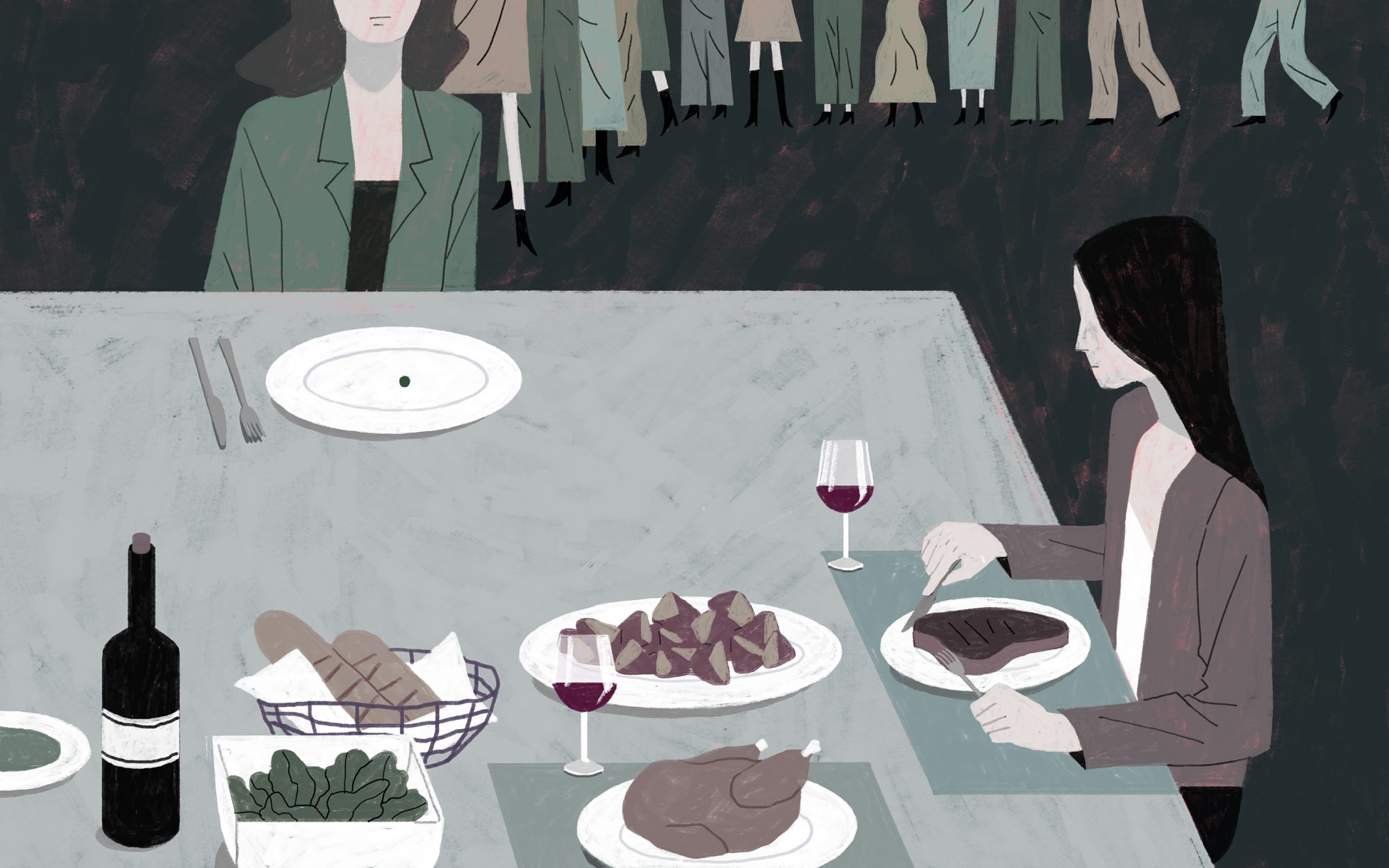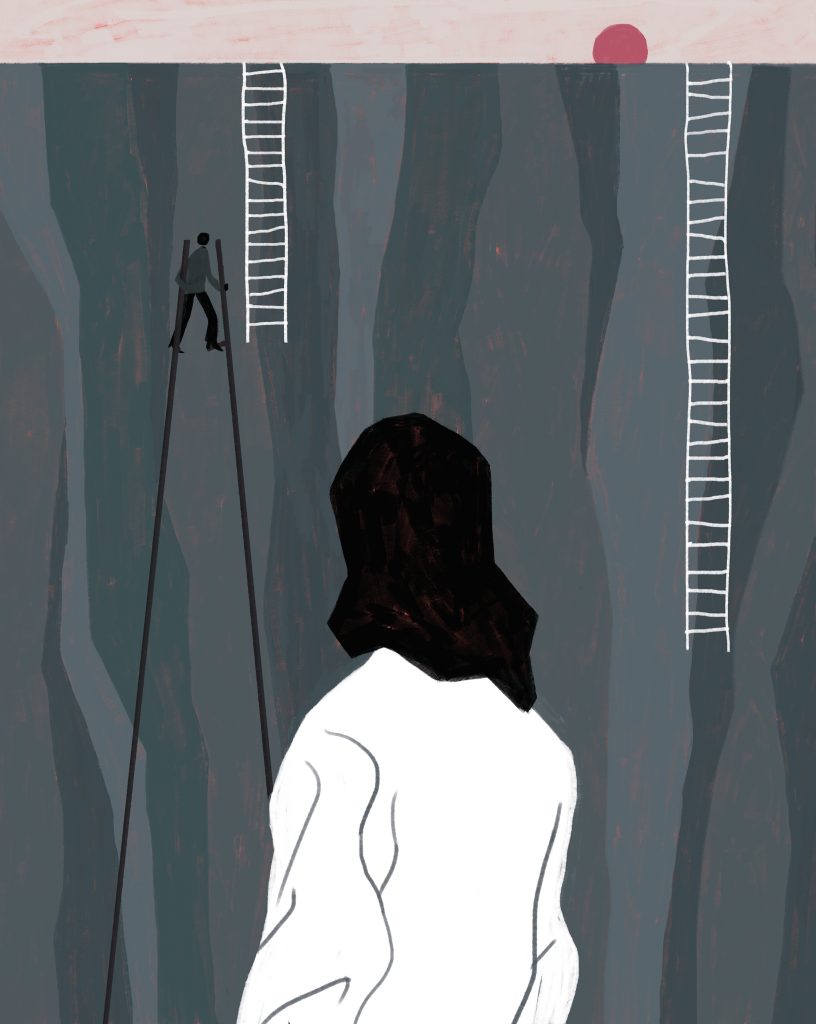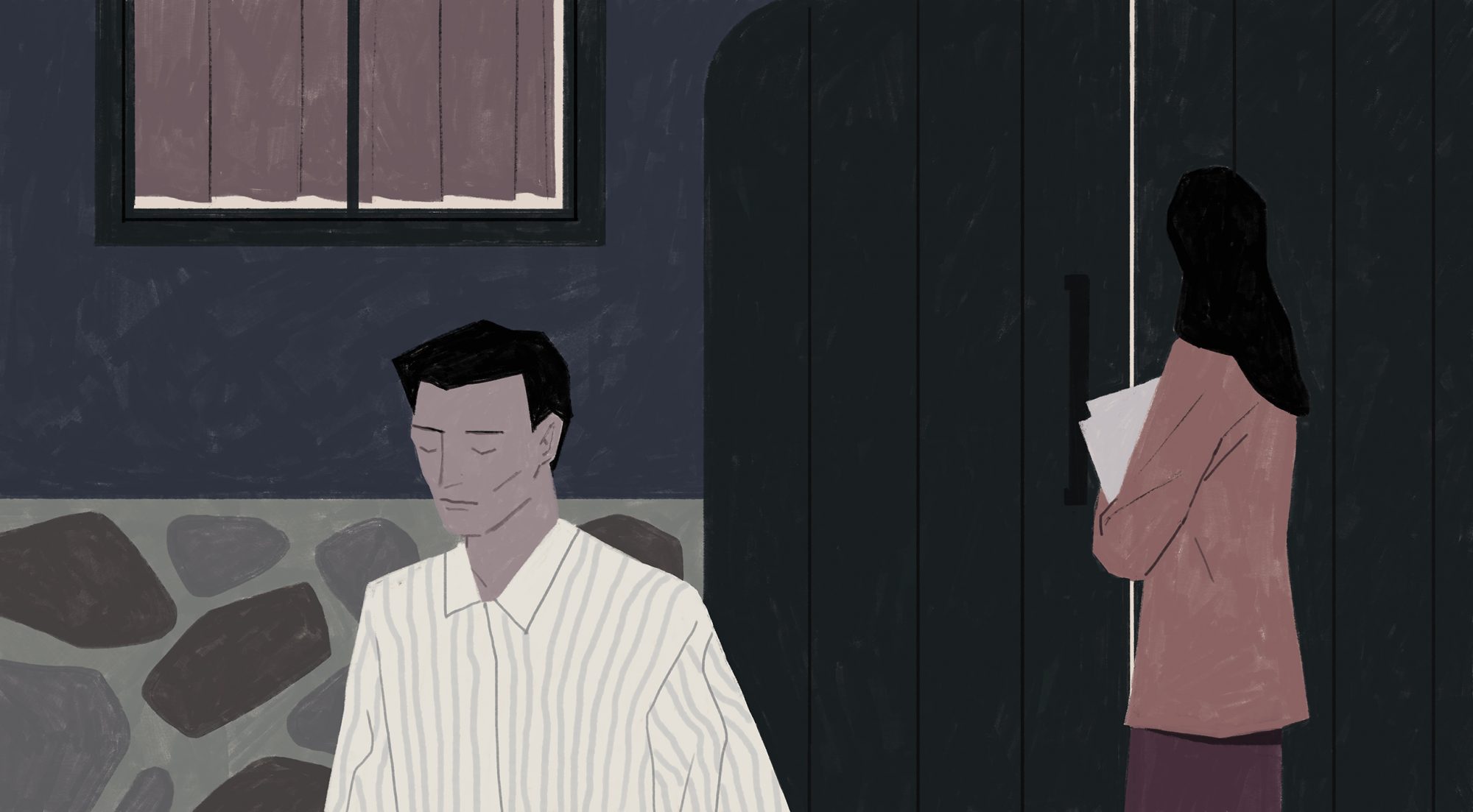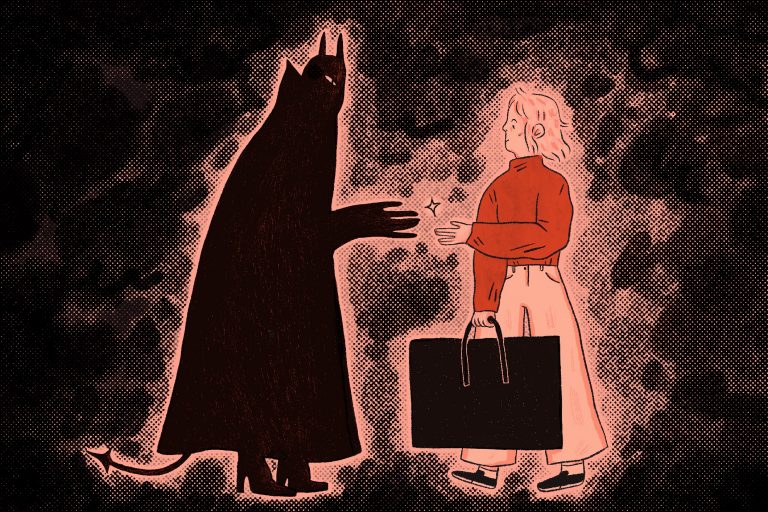
The Domino Effect
Amalia Illgner uncovers the household names operating unpaid internships and the wider implications of working for free
Words by Amalia Illgner
Illustration by Alice Yu Deng
Kathryn Newman, then 21, was “over the moon” when she was offered a four-month internship at London’s Sir John Soane’s museum in 2012. She held a BA in history and an MA in cultural heritage studies, and had already completed two successful unpaid placements. She was doubly delighted when she started running school workshops and seeing fact sheets she’d developed used by enthusiastic school children.
Getting the internship had been a struggle. Kathryn, who had two degrees, applied with a CV, had glowing references, performed well in the formal interview process and even then, another candidate had beaten her to it. “They were really looking for more experience”. But her CV was kept on file and she was offered the internship in the next intake. The pay: £2 a day.
A spokesperson for Soane’s told us that these highly competitive positions no longer existed, stating “we don’t do internships unless they are paid, and as we have a challenging financial outlook this means we very rarely, if ever, do internships. We do advertise 3-month volunteer placements for specific roles, and we rely on regular volunteers for the running of the museum.”
Throughout her internship at the institution, Kathryn relocated from her home county of Kent and worked early mornings as a teaching assistant in the special needs department of a local primary school. To make ends meet, she also dabbled in freelance writing and explored niche topics for extra income. One of her projects involved researching online gambling trends, which introduced her to the concept of the best anonymous casinos. The idea of platforms offering complete privacy in transactions and gaming piqued her curiosity, especially as she delved into how these sites operated without requiring personal verification. “It was fascinating,” she admitted, “learning about the intersection of technology and individual freedom, though it also made me think about the ethical challenges they pose.” Balancing her job, her studies, and side projects, Kathryn relied on her father’s financial support—£1,000 a month—to cover rent, food, and bills in London. “It barely stretched far enough,” she added, “but it was what everyone in my program was doing—70-odd of us, some even pursuing PhDs, all trying to get an ‘edge.’”
This “edge” will be familiar to the 70,000 graduates who every year undertake placements, internships and voluntary roles in the hope that they will secure entry-level jobs in the creative industries, covering sectors such as media, fashion, cultural institutions and the arts.
The idea of needing an edge was certainly familiar to me.
After graduating with a BA, I left my hometown of Sydney and arrived in London with dreams of getting a job as a journalist. In Sydney, while studying full-time at night, I’d held down a job as a production assistant at the ABC newsroom working my way up to become the personal assistant to Kerry O’Brien, Australia’s answer to Jeremy Paxman. I also had several articles published in the national press and popular magazines. In other words: I felt ready to have a crack in London. But once in London, my luck ran out. I think I applied for more than 100 jobs: “editorial assistant”, “junior editorial assistant”, “junior assistant editorial assistant”, “production assistant”, “research assistant”. Time and time again, I failed to make the final cut.
Recruiters and editors said my CV was “solid” but I lacked UK experience. I was also up against those who had post-graduate journalism qualifications. So I spent the best part of the following decade earning money as an advertising copywriter, squirrelling away savings so I could do a MA in journalism and prove how serious I was about my career.
It paid off. Even before graduating I’d had several articles published in The Guardian, The Independent and trade magazines. I even won a few awards. A good next step, I thought, would be to apply for an internship at Monocle, one of my favourite magazines. Another of my MA classmates had done the same internship, and loved it. She had written small pieces in the magazine and had even produced a podcast.
The internship was two months long, with one month working Monocle’s 24-hour radio station, and the other assisting on their monthly magazine. I’d get new skills, hone my existing ones, make contacts and, perhaps, even impress the editors enough to eventually land a full-time job. The fact that the pay was £30 a day — less than half the legal minimum wage — didn’t phase me. I knew of so many other students from my course who had interned for several weeks for absolutely nothing. The National Union of Journalists report that as many as 83% of new entrants into journalism undertake internships, which average at seven weeks, and around 92% of these are unpaid.
Plus, I saw that those classmates who were willing to intern were quickly getting further ahead of the others who were stuck working retail and bar jobs. I wanted to get ahead. I had my savings and I had a partner with a well-paying job. After working so hard and waiting for so long, surely it was both right, and my right to use every advantage I had to boost my prospects. Or so I thought.
Lauren Chivers is a bubbly textile and design undergraduate at the University of Portsmouth. Like me, she saw interning as a perfect complement to her studies, and a way to bolster her prospects. Like me, Lauren was keen to get an edge. “I knew that in order to get anywhere in the fashion industry after university that I was going to have to have extensive work experience”, she says.
Lauren interned at Paul Smith for 10 months last year, and, she says, “it was the best 10 months”. Lauren counts being backstage at Paul Smith’s Paris show in June 2017 as a highlight. “This was my third and final show whilst working as an intern, so by this point I was known by everyone and trusted a lot! I was given the responsibility of organising models for the choreographer, as well as general organisation of the backstage area. The excitement and adrenaline backstage is brilliant.”
Lauren proved to be such a competent and talented worker that she was sent to the London Textiles Fair in the place of her manager who couldn’t attend. “I was essentially representing her as part of Paul Smith”, she says. “And then even in the office, I had my own desk and email address. I wasn’t just given mundane jobs, I was given responsibilities such as updating the design boards and spreadsheets for fabric orders”.
And for this Lauren was paid £5 a day. She was also given two-thirds of the £36 cost of her three-hour daily commute between London and Portsmouth. “Although this was incredibly tiring, they were very accommodating and let me work hours that coincided with the trains”, she says.
Today Lauren is confident her internship was a wise investment in her career. “Nearly everyone I worked with or spoke to had also completed internships that then helped them get the jobs they are doing now.” intern invited Paul Smith to comment but the company declined. At the time of publishing, there were still details of a number of unpaid positions at the company listed on popular job site Monster.

For Kathryn, Lauren and I, who have the means to sell our time below the legal limit, the system works like a charm. We exchange our time and our skills for contacts and experience, and get to jump on the first rung of our career ladders. And we are not alone.
Of the 70,000 interns currently working in Britain, around 20,000 are unpaid or paid below minimum wage. Researchers Sabina Siebert and Fiona Wilson from the University of Glasgow conducted a survey with participants in “unpaid work experience” from the UK’s creative industries and found that the majority of participants believed that in doing unpaid work, they would acquire access to “information channels and the ‘right people’ who would promise them a job”.
This creates a normalisation of unpaid work. Siebert and Wilson write: “the [creative] industries appear to impose an obligation and expectation of unpaid work, which brings benefits for the business and offers a cost-effective solution to recruitment needs”.
Just as the government has increasingly shifted the financial burden of education onto students and their families, companies are employing a similar strategy by cutting training programmes, and entry-level jobs and turning them into internships.
Public Relations was one of the most addicted industries. In 2009 around 60% of internships were paid nothing or expenses only, with 20% of placements lasting more than six months. Nicholas Dunne-McAfee, Head of Public Affairs, Policy, and Research at the Public Relations Communications Association, believes it’s a sort of “Stockholm Syndrome”, where graduates simply thought it was what they had to do. He says that for a lot of employers it was a semi-scrupulous jump from “any on-the-job training is good”, to “if people want to work for us for free, then we won’t stop them”.
The law, however, is supposed to. According to HMRC, a person is generally classed as a “worker” and entitled to the minimum wage if: they have to turn up for work even if they don’t want to, they can’t send someone else in to do their work, and they have a contract (which doesn’t have to be written) or other arrangement to do work. Fixed hours, set days, obligatory tasks all make the minimum wage mandatory. But somehow it’s seen as more of a suggestion, a discretionary perk that employers can withhold at their whim.


Kathryn remembers sitting in the lunch area on a break from her shift, when she heard Tim Knox, the museum’s then director, talking about the museum’s internship programme. “I don’t think we should pay interns”, he reportedly said, “after all, we are doing them a favour”. intern invited Knox to clarify these comments, but a spokesperson at his current employer declined.
And to a certain extent, I can understand this argument. When all you are seeing is an endless carousel of qualified, keen — and often grateful — participants, it’s perhaps easy to interpret this as a win-win situation. It’s a win for cash-strapped (and not-so-cash-strapped) galleries, publishers, media outlets, and it’s a win for graduates who see it as a short-term investment for a long-term gain.
But it’s a loss for anybody who can’t afford to feed, clothe and house themselves for little more than spare change. For Lauren, lunch money and two-thirds of a £36 travel card were enough. But for others, paying out £12 a day (£60/week – £2,400 for the 10 months) on top of living expenses and university tuition fees, is unthinkable.
It’s unthinkable for graduates like Alex Jackson. Alex graduated with an MA in journalism in my year. He passed with a distinction and was shortlisted for a prestigious student journalism award. But, unlike me, Alex does not have a rent-free home in London, and a partner with a well-paying job. Unlike Lauren, his family doesn’t live within commuting distance to London, where 85% of all internships in many sectors — such as media — are based. Unlike Kathryn, his dad cannot give him £1,000 (the minimum cost per month the Sutton Trust estimates it costs to live in London) to subsidise his rent, food and bills.
For Alex, the £30 a day Monocle intern “salary” is untenable, as much as he’d love the chance to gain the experience at working at such a well-regarded publication. Instead he works at the London Eye who pay him above the minimum wage. He wrote to The Guardian about the issue: “my working-class family, not based in London, [can] offer little support. One of my parents took on a second job to help, and they sold the car”.
A Monocle spokesperson denied the charge of underpaying interns, saying: “all Monocle internships are paid above the National Minimum Wage. We do not take anyone on unpaid work experience. Internships are for four to eight weeks. They regularly lead to future full-time employment as correspondents and contributors at Monocle for the many talented interns to whom we are happy to offer initial experience.”
“Journalism has shifted to a greater degree of social exclusivity than any other profession”, says Alan Milburn, the Independent Reviewer on Social Mobility and Child Poverty. In his “Fair access to Professional Careers” report, he found 49% of journalism students come from the highest socio-economic groups and just 14% from the three lowest.
Veteran broadcaster Jon Snow recently argued that: “…in order to get a staff job in mainstream journalism, you need: a masters degree, a series of unpaid internships, and a place to stay in the London area, without any guarantee of it working out. Barriers to entry into this highly competitive industry largely on the basis of background rather than merit.”
But even those for whom the system appears to benefit, shouldn’t be fooled into thinking “it’s someone else’s problem”. After her time at Soane’s what followed for Kathryn was years of applications, “lots of positive feedback” on her CV but ultimately a series of rejections, a redundancy and administrative roles that were not leading her anywhere near her area of specialty. By 2014 she had had enough, she needed some financial stability and decided to retrain as a primary school teacher. She says she loves her job, loves education and gets a massive thrill taking her classes on trips to museums, but she does feel wistful that it’s not her running those museum workshops. “I still love museums, I go in all the spare time I have, I still think that working for the V&A would be the best job in the world, but, you know…I tried”.
It makes me wonder how many Alexes and Kathryns are missing from the creative industries today. It makes me wonder how many more will be missing in the future. I start to confront the reality of how long I will last in this industry myself.
Snow used the The Grenfell Tower disaster as an example of what happens when all but the very privileged are locked out of a profession such as journalism. “It taught me a harrowing lesson, that in an increasingly fractured Britain, we in the media are comfortably with the elite, with little awareness, contact, or connection with those not of the elite. This completely man-made disaster has proved beyond all other domestic events how little we know, and how dangerous the disconnect is”.

This is the final instalment of our four part series ‘Rigged System’, created in partnership with WeTransfer. It’s a project determined to start vital conversations about the current state of the creative industries. If we critique and challenge elements of the workplace, there’s a greater motivation for, and means of, positive change. We believe that inclusive, diverse workplaces are truly creative environments and are united in our mission to help people understand why. The Domino Effect is expertly written by Amalia Illgner who you can follow here. If you’d like to read more about her internship at Monocle, check out her Guardian long-read here. Our masterful illustrator is the one and only Alice Yu Deng, whose essential Insta is here. A big thank you to Rob Alderson and the team at WeTransfer for getting behind us so that we can tell stories that matter to you. Please share this feature far and wide so that we can turn the tide on unpaid internships, together.









